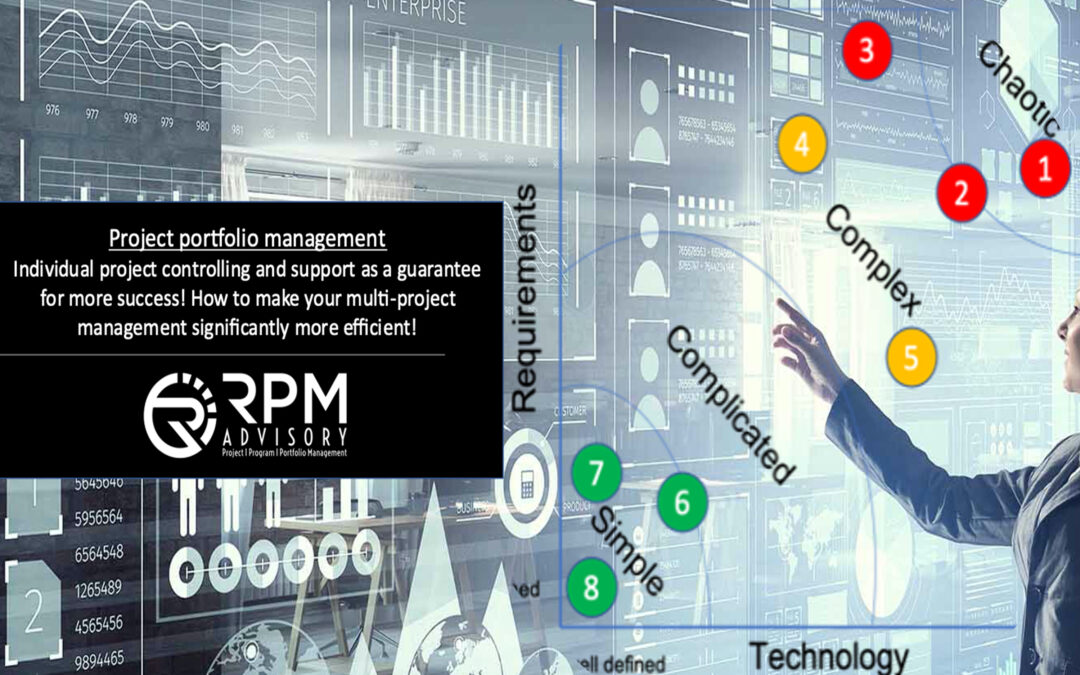Dear decision-makers, portfolio and program managers and executives,
over the years of my professional career in the corporate world, I have noticed time and time again that attempts are or have been made, to manage projects almost uniformly.
Based on the fact that projects can be hugely different in their complexity it is obvious that this does not make really sense.
Why does it not make sense and what do I mean by individual project management?
Well, you should not treat a highly complex project, such as building a complex app for usage in the whole of Europe, in the same way as a very simple project. An example of a very simple project would be the set up of a standard company homepage, with the help of a WordPress template, by your in this field already very experienced team of developers.
Conclusion: Complex projects need more and simple projects less attention.
This article will briefly show you how you can manage your project portfolio more efficient in total, based on the acceptance that your project portfolio is diverse.
So how should you act if you have to manage a diverse project landscape?
The recommendation is, first analyse your and your current project portfolio management and your established multi-project management methods, tools and processes.
The following questions can help you to get a first overview:
- Which projects do we have?
-> Result: Project list including details of the projects. - How do we currently manage and support our projects?
-> Result: Transparency on processes, methods, toolsand meetings as well as steering structures etc.. - What transparency do we have about the current status of the projects ?
-> Result: Transparency about project reporting standards, current project status etc.
After you have created an initial overview and more transparency on the status quo, you should start to evaluate the simplicity or complexity of your projects. The classification of your projects in a Stacey matrix can help you to do this. You can enter your projects in this matrix depending on:
Clarity of the project goal and the corresponding requirements for the project (y-axis)
Clarity of the approach to be used to achieve the project goal (x-axis)

After sorting your projects into the matrix, you will get a clear picture of how different your projects are and how different they have to be managed. This is the base to set up a project portfolio management approach, which takes the diversity of your project landscape into account.
The key takeaway is here: The more complex your projects are, that means the higher up on the right of the matrix, the more agile they need to be managed.
Being managed in a more agile way means in this context particularly, that these projects need more management attention and support than “simple” projects, which would be found at the bottom left of the matrix (see also the blog post: 12 easy to use agile quick-wins to boost your performance!).
In the above Stacy Matrix, projects 1, 2 and 3, which are in the “Chaotic Area” should therefore receive the most support from you. Projects 4 and 5 should receive less than 1, 2 and 3 but more than 6, 7 and 8.
Conclusion: The management of your projects should be based on the individual project support needs, in order to make your portfolio management as efficient as possible.
So, if you are currently managing your project portfolio in a rather uniform way, you should change this.
According to the prior explanation I recommend you manage your project portfolio accordingly. Give your more complex and currently prioritised projects (see chart – Projects 1,2,3) more time in your meetings, steering committees and consultations etc.. On the other hand, reduce the efforts for supporting etc. “simple” projects (see chart – Projects 6,7,8) and empower your teams instead more in these cases.
What do you think? Do you have any questions or further examples of how to optimize project management in complex environments? We are looking forward to your comments or suggestions.
In case you need support in order to improve your multi-project management and team performances don´t hesitate to send us a message: info@rpma.de or call us: +49 178 6892464
We would be happy to talk to you and discuss your challenges and possible solutions. We are looking forward to hearing from you.
Best regards, Xavier
———————————————————————————————————-
Xavier Reckers
PMP; MSP; PSM; PSPO; SA; PMI-ACP; Diplom Volkswirt
This article was already published in a similar version in German, first in 06.2019 on rpma.de. Although time has passed all already previously presented facts of this article are still valid today.
About us:
Turning ideas into reality!
Good project management is currently more important than ever, to handle the high speed of change in the business and project world. RPM Advisory offers consulting and support services for project management and agile/digital transformation topics. Your value is our focus!
For further information about our services etc. please send an email to: info@rpma.de


Recent Comments